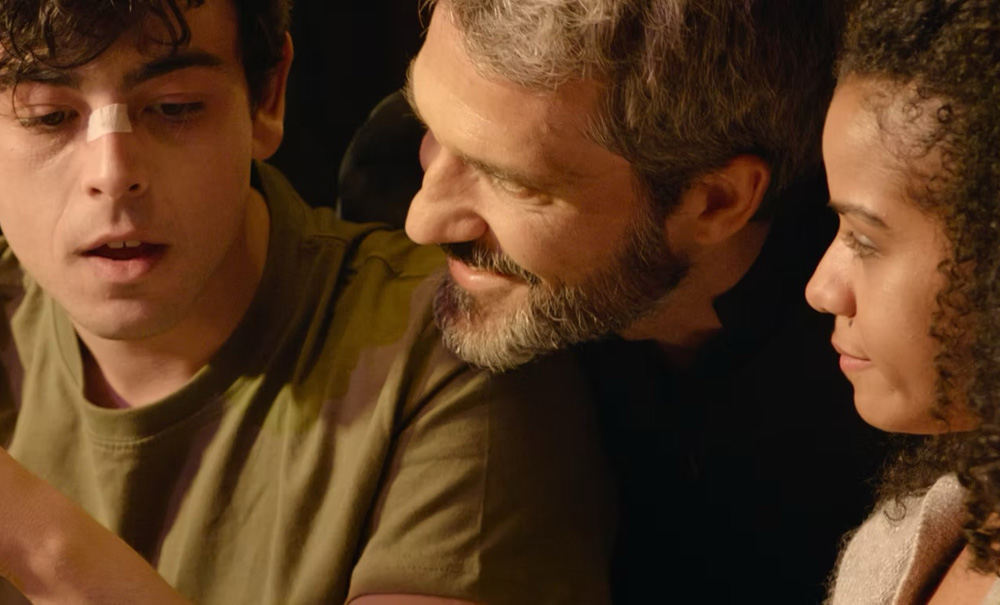Delphine (Sophie Colon) was expecting to relax as she settles into the summer home she shares with her husband Antoine (Mathéo Capelli) in “Endless Summer Syndrome,” but she can escape the outside world entirely, still beckoned by a Zoom call for work before she can lounge by the pool. Besides being able to unwind, she is eager to spend time with her family when her son Aslan (Gem Deger) is set to move across the Atlantic to New York to study architecture and her daughter Adia (Frédérika Milano) is feeling as crestfallen as she is about the impending move, hoping to bring the family together for one last good time together before life takes all of them in different directions. However, while Delphine handily dispatches her work-related call, she can’t shake the unexpected one that immediately follows when a colleague of Antoine who won’t reveal her name passes along some disturbing murmurs she heard from her husband after a group of co-workers went out after hours and got a little too drunk.
Delphine may hang up almost immediately, but the words linger in her mind for the entirety of Kaveh Daneshmand’s unsettling thriller, set in the French commune of Corrèze where the nearby dam starts to look appealing as a final resting spot when things grow so dire in the house. In the grand tradition of provocative potboilers from Claude Chabrol and Rene Clement, the film has a few moves that likely wouldn’t have made it past the censor board in their day as Delphine finds there’s no one she can trust within the walls of her home upon suspicions that Antoine may have had an inappropriate relationship with one of their adopted children. In a family with bohemian predilections as Delphine can be seen enjoying a joint with Aslan to take the stress off and no one feels the need to cover up around the pool, the matriarch is deeply shaken by not only the potential immorality of her husband, but whether her own permissiveness may be an issue.
The shock of what Delphine discovers as she gets to the bottom of the situation is likely to stick with viewers, but so to is the skill that Daneshmand and company show for a consistently taut contained thriller where the tension builds and builds. When the family is comprised of people whose bonds aren’t rooted in blood, the decision to stay in certain relationships as they take on some toxicity becomes unusually intriguing and while the characters comes to question what they know about one another, an audience has to ask themselves about certain assumptions they’ve made as well. Withe the film now making its way to the U.S. after premiering last year at Tallinn Black Nights Film Festival, Daneshmand and his co-writer and star Deger recently took the time to talk about making the most of their time spent in lockdown and a desire to get creative, embarking on a production that wouldn’t be in their native tongue and learning that snails, a pet of Aslan, have bite, much like the rest of their film.
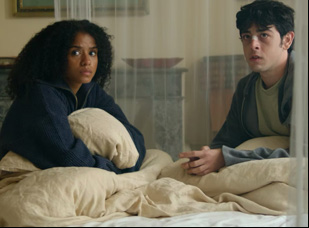
Gem Deger: We’ve been friends for a very long time. I’m from Turkey, Kaveh’s from Iran and he also works at a film school, so we met seven years ago in Prague. He was supposed to be my directing tutor, and that didn’t happen because I’m not really tutorable. [laughs] But we became friends, and back in COVID lockdown, we wanted to do something because we were really bored and that something basically grew to be “Endless Summer Syndrome”. All the people who are involved in it are basically people within the expat community within our reach.
Kaveh Daneshmand: When we started thinking about making a film during the lockdown, we were also thinking about our resources. We had very limited budget, so we first came up with a found footage horror [idea] and then slowly, as we were brainstorming, we landed on this story. None of it was inspired by COVID or lockdown, but we had plenty of very close friends from various backgrounds who were also very frustrated and wanted to do something [during this time], so we got together and we made this film.
Kaveh, I’ve head you don’t actually speak French. Was it intimidating taking on a production in a different language?
Kaveh Daneshmand: It was very intimidating. It was not only the French language, but also the intimacy, the topic, the French culture. You’re portraying a French family, so that was very, very scary for me and I remember when we were even flying to France, I was still not sure what I’m putting myself into. But we had a fantastic team and many of them were French and spoke fluently. Almost everyone on the film set had very good understanding of the French culture, so I had a lot of consultations with all the actors, the [director of photography], the producers regarding the French side of the story and slowly we managed to demystify this fear [for myself] and I got over it. But the result is not my work. The result is the work of a group of creative people around.
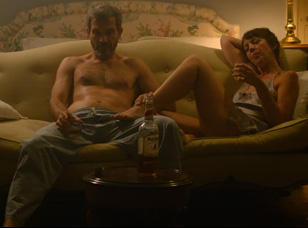
Gem Deger: Honestly, it was the second. Whatever film we would do, I wanted to have a part in it, but we just didn’t know what it was. Then once we come up with the [plot] for this film, we knew immediately that I was going to be Aslan, and [the character] was really similar to where I was in my life back at the time, so while writing these characters, I put so much from myself into this character, even on the creation and the story level.
This family all have these individual connections with one another when they aren’t actually bonded by blood. What was it like to think about their relationships?
Kaveh Daneshmand: We were working on it extensively. Of course, when Gem and I were working on the story, we kept about the story from various angles and “What’s the relationship between the mother and the father? What’s the relationship between the father and the daughter, father and the son, mother and the daughter?” As we talked about it, the story started developing and we wanted to make sure that it’s not just one side of the family we’re looking at. That would be a very boring look at the family. Then when the actors got involved and our co-writer Laurine [Bauby], got involved, we kept working on the nuances of the relationship and it was a process of four months of working on the relationships between the characters.
It was Laurine who translated the script into French, right?
Kaveh Daneshmand: Translation is just the beginning of what she did. She did a lot more. She wrote the script with us. She was our French connection and she really integrated the story into the French culture. She did the casting of the film andworked with Jem on his French. She was next to me during the shoot because I am deaf to French, so she was really co-directing the film and during the editing process, she was always giving us comments, so she was a huge creative force in the film from the early development all the way to the post-production.
Wow, Gem, I couldn’t tell your French needed work.
Gem Deger: I was familiar with the language because I studied French at school when I was 16, but I wasn’t really fluent because we were shooting the film 10 years since I spoke any French, so I was nowhere near being fluent and I really needed to be coached. Every night after we wrapped, [Laurine and I] would go and work on the next scene that I had on the next day together. Sometimes she would give me line readings even. And especially with the scenes with Sophie, I never understood her. She has this very unique way of talking — she uses her breath and it was very hard for me to pick up on that, so I would just basically memorize my parts and her parts and once [she’d say her line], I would continue with my part. That was a challenge and there were a couple of scenes where I was doing what I’m doing without really understanding what’s going on. But without Florine, I don’t think I would be able to act in French and I don’t think I’ll be doing this again in the near future because it was a big task.
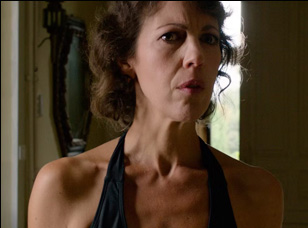
Kaveh Daneshmand: When we were doing the casting process, we found the three other actors almost all in the first round of casting, from the photos and the videos we received and they were spot on how we imagined the characters. But when we met them for the rehearsal for the first time, it was two months before the actual shoot in Paris and a lot of the details of these characters changed based on the actors that were in front of us. Gem and the other three actors connected right away and we could really openly discuss all the relationships in the family. It kept developing as we moved forward.
Sophie Colon, in particular, has a demanding role as the mother Delphine when so much of it is based in reaction to things she can’t really act opposite. For instance, with the phone call that sets off all the action, was there anyone on the other end of the line?
Kaveh Daneshmand: Well, there was a real call on the set. We had Laurine performing [the other end of the call] very well, and then you actually hear her voice in the film, so Sophie was actually reacting to an actual voice in that scene. This was also the scene that we have for the self-tapes, and how we chose Sophie. It was a complex scene and even on the self tape, what she did at her own place, she nailed it. It could become boring because it’s close to four minutes, but with a lot of blocking decisions that we made on the shooting location and a lot of work with her throughout the rehearsals, she was really in this character. And in most of the cases, she knew already very well what needed to be done, so we were only working on the details with each other.
Was blocking this fun with such a great house to work with?
Kaveh Daneshmand: We lived in that house during the shoot, so we had so much time every day after the shoot to go around the locations where we were shooting the next day and work out the best blocking, the best camera angles. Gem and I discussed this extensively during the pre-production before even going to the shoot and then with Cedric [Larvoire, our cinematographer] when we were on the set. It was a lot of fun because it was a gorgeous place with a lot of corners, a lot of doors, a lot of corridors and every angle of the house also looked beautiful and we wanted to use the house organically.
Gem Deger: And once we decided to work with our DOP, who was also one of the producers of the film, it was the chateau he and his wife, who was also one of the producers in the film, got married in 10 years ago, so the moment they had the [script], they immediately thought of that location. They showed us and we were like, “Oh hell yeah, can we get that place?” So they convinced the owners because our budget would definitely not allow us to shoot in a place like that and thanks to them, we ended up having that awesome chateau.
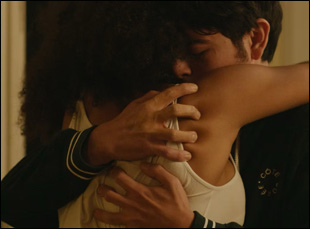
Gem Deger: That was definitely my input to the story as well because before it became a device in the story, we were trying to make each character interesting and real, so we came up with this hobby for Aslan. He would be interested in bugs and snails, which was from when I was a kid myself because I don’t know why, but I would collect snails on the street, so I always had a soft spot. That’s how it became a part of the story, but then working with snails, I don’t know if you know about this, but snails actually do bite and I got to realize that with Bob, which is this big African snail that we see in the film. During that scene in the snail chamber, it kept biting me and [others] would tell me, “He doesn’t have teeth, he doesn’t bite,” but in fact, it does. It was not painful, but it was definitely uncomfortable and I got used to it, but it was harder for Frédérika [Milano] because once it happened to her, she really screamed. But it was just one scene, so we got over it.
What’s it been like to get this out into the world?
Kaveh Daneshmand: It’s been a very, very pleasant journey for us. This film was shot with a budget that was probably sufficient to shoot a short film, and almost everyone who got involved in the film just did it out of passion. We shot it in 14 days, which is an insanely short amount of time to shoot a feature, so when we started actually working on its festival life and distribution, we had no idea what would come out of it. Of course, we were very worried, but to our surprise, there was never like a time after the film premiered in Tallinn that we didn’t have [another playdate] coming up. There was always a festival — in India, in Argentina, in England, and in the United States and we got distribution in the U.S., thanks to Altered Innocence and we are very honored to have had this luck to work with the people we worked with during the production and all the great distributors we have encountered now.
Gem Deger: Yeah, Altered Innocence really changed the game for us because the U.S. market was one of the main markets that we really wanted to expose the film to and they’ve done an amazing job, so I really feel blessed that we met each other. I can even say that until Altered Innocence was on board, we ate shit, so I’ll be honest, we’re really grateful for Altered Innocence, Frank [Jaffe] and that team.
“Endless Summer Syndrome” opens on December 13th in New York at the Quad Cinema and Los Angeles at the Laemmle Glendale. It is also available on Vimeo on Demand and Amazon on Demand.




